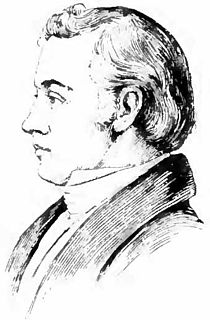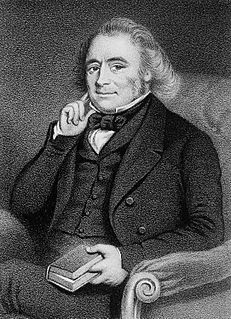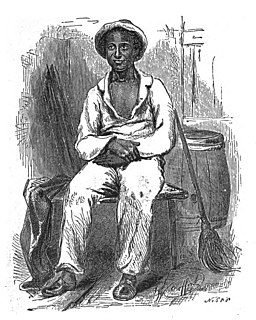A Quote by Charlotte Bronte
My God, whose son, as on this night, took on Him the form of man, and for man vouchsafed to suffer and bleed, controls thy hand, and without His behest, thou canst not strike a stroke. My God is sinless, eternal, all-wise, and in Him is my trust, and though stripped and crushed by thee, -though naked, desolate, void of resource- I do not despair:where the lance of Guthrum now wet with my blood, I should not despair. I watch, I toil, I hope, I pray: Jehovah, in His own time, will aid.
Related Quotes
The man who knows God but does not know his own misery, becomes proud. The man who knows his own misery but does not know God, ends in despair...the knowledge of Jesus Christ constitutes the middle course because in him we find both God and our own misery. Jesus Christ is therefore a God whom we approach without pride, and before whom we humble ourselves without despair.
Have I then no work to work in this great matter of my pardon? None. What work canst thou work? What work of thine can buy forgiveness or make thee fit for the Divine favour? What work has God bidden thee work in order to obtain salvation? None. His Word is very plain and easy to be understood, "To him that worketh not, but believeth in Him that justifieth the ungodly, his faith is counted for righteousness" (Rom. 4:5). There is but one work by which a man can be saved. That work is not thine, but the work of the Son of God. That work is finished.
A God must have a God for company.
And lo! thou hast the Son-God to thy friend.
Thou honour'st his obedience, he thy law.
Into thy secret life-will he doth see;
Thou fold'st him round in live love perfectly-
One two, without beginning, without end;
In love, life, strength, and truth, perfect without a flaw.
Christianity set itself the goal of fulfilling man’s unattainable desires, but for that very reason ignored his attainable desires. By promising man eternal life, it deprived him of temporal life, by teaching him to trust in God’s help it took away his trust in his own powers; by giving him faith in a better life in heaven, it destroyed his faith in a better life on earth and his striving to attain such a life. Christianity gave man what his imagination desires, but for that very reason failed to give him what he really and truly desires.
If a man has no worries about himself at all for the sake of love toward God and the working of good deeds, knowing that God is taking care of him, this is a true and wise hope. But if a man takes care of his own business and turns to God in prayer only when misfortunes come upon him which are beyond his power, and then he begins to hope in God, such a hope is vain and false. A true hope seeks only the Kingdom of God... the heart can have no peace until it obtains such a hope. This hope pacifies the heart and produces joy within it.
If with love thy heart has burned; If thy love is unreturned; Hide thy grief within thy breast, Though it tear thee unexpressed; For when love has once departed From the eyes of the false-hearted, And one by one has torn off quite The bandages of purple light; Though thou wert the loveliest Form the soul had ever dressed, Thou shalt seem, in each reply, A vixen to his altered eye; Thy softest pleadings seem too bold, Thy praying lute will seem to scold; Though thou kept the straightest road, Yet thou errest far and broad.
Commemoration of Brooke Foss Westcott, Bishop of Durham, Teacher, 1901 Be not afraid to pray... to pray is right. Pray if thou canst with hope; but ever pray Though hope be weak, or sick with long delay. Whatever is good to wish, ask that of heaven; But if for any wish thou darest not pray, Then pray to God to cast that wish away.
Yet, for I know thou art religious
And hast a thing within thee called conscience,
With twenty popish tricks and ceremonies
Which I have seen thee careful to observe,
Therefore I urge thy oath; for that I know
An idiot holds his bauble for a god
And keeps the oath which by that god he swears,
To that I'll urge him: therefore thou shalt vow
By that same god, what god soe'er it be,
That thou adorest and hast in reverence,
To save my boy, to nourish and bring him up,
Or else I will discover naught to thee.
At such times, the heart of man turns instictively towards his Maker. In prosperity, and whenever there is nothing to injure or make him afraid, he remembers Him not, and is ready to defy Him; but place him in the midst of dangers, cut him off from human aid, let the grave open before him, then it is, in the time of his tribulation, that the scoffer and unbelieving man turns to God for help, feeling there is no other hope, or refuge, or safety, save in his protecting arm.
Is it thy will, thy image should keep open My heavy eyelids to the weary night? Dost thou desire my slumbers should be broken, While shadows like to thee do mock my sight? Is it thy spirit that thou send'st from thee So far from home into my deeds to pry, To find out shames and idle hours in me, The scope and tenor of thy jealousy? O, no! thy love, though much, is not so great: It is my love that keeps mine eye awake: Mine own true love that doth my rest defeat, To play the watchman ever for thy sake: For thee watch I, whilst thou dost wake elsewhere, From me far off, with others all too near.
The opposition is indispensable. A good statesman, like any other sensible human being, always learns more from his opponents than from his fervent supporters. For his supporters will push him to disaster unless his opponents show him where the dangers are. So if he is wise he will often pray to be delivered from his friends, because they will ruin him. But though it hurts, he ought also to pray never to be left without opponents; for they keep him on the path of reason and good sense.





































